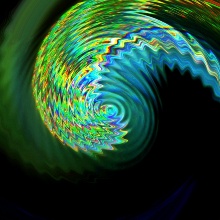The image above is a testament to the value of making science visible to the general public. Here we can visually encounter the results of an open mind. That is, scientists at NASA, CERN and SAKURAI brought together an ultra-high-intensity laser, a particle accelerator, and a willingness to approach a vacuum not as an empty void, but rather as a balance between matter and antimatter wherein particles could be conjured, instead of annihilated.
(See https://www.sciencedirect.com/science/article/pii/S0370157319300043).
Shaping Stories about our Planet’s Shared Destiny
This project on Science Communication, co-funded by the Stuttgarter Change Labs (https://www.project.uni-stuttgart.de/changelabs/) and the department of English Literatures and Cultures (https://www.ilw.uni-stuttgart.de/en/departments/english-literatures/), arises out of a desire to find a pragmatic and course-based context for enhancing the collaboration between, and integration of, the humanities faculty and the science faculties at the University of Stuttgart, which is especially important since they are seperated geographically across two main campuses.
These potential hurtles, however, can lead to rich and innovative transdisciplinary interactions, which are at the heart of the 'Stuttgarter Weg' [Stuttgarter Way: https://www.uni-stuttgart.de/universitaet/profil/leitbild/], an initiative dedicated to discovering concepts fluid enough to intersect disciplines. What particularly motivates this approach is a dedication to transdisciplinary intelligent systems that are dynamic and adaptive, robust and resilient, and integrative and interdependent.
Beyond the prerequisite of a common arena for meaningful exchange (e.g., the classroom in this project), intelligent systems require a shared terminology and language. Indeed, there are many benefits for crafting a common language among the humanities and the sciences, especially since each field is committed independently to improving climate responsiveness in line with the UN Sustainable Development Goals: https://sdgs.un.org/goals.
The objective, then, for any well-crafted science communication is to reach those outside of one's bubble and to foster dialogues that are grounded, open, and action-oriented. Above all, by integrating discussions about climate change into transdisciplinary exchanges – allowing one field to develop new methods through the perspectives of another – an influx of ideas may arise from a synthesis of approaches. As a result, this important conversation can better reach nonexpert audiences.
In this cross-listed course, we brought together students from various faculties to model environmental solidarity among companion fields, either as future scientists or teachers of a science-related field, or as future literary scholars or teachers of English. Students worked with environmentally-focused writers (see the recorded talks below) to workshop, perform, and record their own cross-genre and cross-disciplinary texts, in addition to reading and discussing eco-critical literature.
The course culminated in a podcast assignment modeled after Dr. Sam Illingworth's podcast series The Poetry of Science: https://www.samillingworth.com/podcast. Therein, each group sought out a recent scientific study about climate change, which they then summarized in precise and down-to-earth English accessible to a nonexpert audience. That is, they enacted the principles of Science Communication. Thereafter, each member in the group composed a poem connected to the group's climate-related topic, which each read aloud, before closing with a published poem on the topic of the scientific study. The recorded podcasts from the participants in the course (compiled here) will also be broadcast on the Universität Stuttgart radio station, HORADS 88.6: https://www.horads.de/
In a nutshell, the participating students from various faculties at the University of Stuttgart fulfilled the objectives of the 'Stuttgarter Weg' by collectively enacting transdisciplinary environmental solidarity and kinship.
Lecture Recordings of our Guest Speakers
Podcasts
Further Reading & Listening
1. The three primary readings of our course that served as prime examples of science communication:
- Frans de Waal's "Are We Smart Enough To Know How Smart Animals Are?": https://wwnorton.com/books/Are-We-Smart-Enough-to-Know-How-Smart-Animals-Are/
- George Marshall's "Don't Even Think About It -- Why Our Brains Are Wired To Ignore Climate Change": https://www.bloomsbury.com/uk/dont-even-think-about-it-9781632861023/
- David Wallace-Wells' "The Uninhabitable Earth": https://www.penguinrandomhouse.com/books/586541/the-uninhabitable-earth-by-david-wallace-wells/
2. Poets for Science: A project supporting the scientific community and offering great examples of Science Communication through Poetry: https://poetsforscience.org/
3. Ginko Prize: An international award dedicated to ecopoetry. Visit their workshops and take a look at their collection of ecopoetry: https://ginkgoprize.com/
4. Experimental Words: A spotify album that Dan Simpson and Dr. Sam Illingworth (two of our guest speakers) made as an interconnection between science and spoken word: https://open.spotify.com/album/4sLT8AMakxGnBnNndErfSG?si=G5cGG_I3SUqqo0_kjAIETA&dl_branch=1&nd=1

Jessica Bundschuh
Dr.Academic Staff



